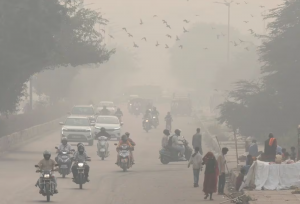A $1.4 billion tax demand from India is renewing concern around the country’s policies on foreign firms, at a time when global businesses are eyeing expansion in the world’s fastest-growing major economy.
Be it for Japanese firms working to reduce their dependence on China or global aerospace firms hoping to escape a Western supply chain crisis, India is fast becoming top destination for business.
But the country’s tussle with German auto giant Volkswagen, on a record $1.4 billion tax demand, is also in focus this month, after the carmaker sued authorities over the “impossibly enormous” amount.
Also on AF: Taiwan, White House Concerned on Potential TSMC Stake in Intel
On Monday, a lawyer for the company’s Indian unit told a local court that if Volkswagen India were to pay all the claimed taxes and penalties – a total of $2.8 billion – the company, which employs 6,000 people locally, may not be able to survive in India.
“It’s a matter of life and death now,” Volkswagen India’s lawyer Arvind Datar said in a court in India’s financial capital of Mumbai.
What’s the Volkswagen case?
Indian tax authorities say the humongous demand is a result of tax evasion by Volkswagen over 12 years, during which the carmaker broke down imports of some VW, Skoda and Audi cars into many individual parts to pay a lower duty.
They allege Volkswagen imported “almost the entire” car in unassembled condition, which should attract a 30-35% tax applicable on CKDs, or ‘completely knocked down’ units, but evaded the levies by mis-classifying them as “individual parts” coming in separate shipments to then pay just a 5-15% levy.
Meanwhile, in its suit against officials, Volkswagen India says it had kept the Indian government informed of its “part-by-part import” model and received clarifications in its support in 2011.
The tax notice is “in complete contradiction of the position held by the government … (and) places at peril the very foundation of faith and trust that foreign investors would desire to have in the actions and assurances” of the administration, the January 29 court filing states.
What are India’s taxation problems?
In the highly competitive auto sector, Volkswagen is not alone in facing tax scrutiny. Automakers such as Maruti Suzuki, Hyundai, Honda and Toyota face demands for about $6 billion collectively in disputes on income-tax, customs and other payments that go back years, Reuters analysis shows.
Concerns are also high on the country’s lengthy tax investigations, often triggering lawsuits that stretch over years.
In one high-profile incident, telecoms company Vodafone won its case against a $2-billion retrospective Indian tax demand after more than a decade of legal battles with New Delhi, including international arbitration at the Hague.
“Such instances can deter foreign companies from investing heavily in India,” Ameya Dadhich, a tax associate at global law firm DLA Piper told Reuters, noting that around 40,000 tariff disputes were still pending in Indian courts.
Government data shows total pending arrears of service tax, customs and excise levies stood at nearly $53 billion in November 2024, with a whopping 70% disputed in litigation.
In the category of import tariff, or customs disputes alone, India had made tax demands of $4.5 billion by March 2024 with a third of those pending for more than five years.
In its case against Indian authorities, Volkswagen blames officials for their “inaction and tardiness” in taking years to review shipment records, some stretching back to 2012.
Had New Delhi wrapped up its reviews earlier, Volkswagen says, it could have challenged the move or re-evaluated its import strategy, but the tax notice now puts “at peril the very foundation of faith and trust” foreign investors desire.
Why does this matter?
The concerns flagged by Volkswagen run contrary to a growing push by Indian Prime Minister Narendra Modi to woo foreign investors with promises to simplify regulations and uproot bureaucratic hurdles.
Modi wants to turn India into a manufacturing hub, but many electronic and auto companies rely on assembly operations using parts for high-end cars or smartphones imported from markets such as China and Europe, often spurring investigations.
India’s oft-criticised tariff policies are also under renewed scrutiny, following threats of reciprocal taxes by US President Donald Trump, who has called the country a “very big abuser” on trade.
Last week, Modi flew to Washington with promises of lower tariffs and better trade deals in an effort to avert those reciprocal tariffs.
He also met with Trump’s close aide Elon Musk, following which Musk’s electric vehicle firm Tesla began hiring senior staff in India this week.
Tesla has for years planned to enter India, including by setting up local manufacturing plants. But it has backtracked those plans each time after citing high Indian tariffs. Imports of fully built luxury cars face Indian taxes and levies of about 100%.
So while Tesla’s renewed interest in India would signal progress through talks with Modi, the Volkswagen case could draw a different kind of scepticism, and force foreign firms to re-evaluate their plans to invest in the country.
An immediate effect of the Volkswagen case has been that tax advisers and lawyers are now fielding nervous queries from clients about how years-old tax cases could come back to haunt them.
Clients want to know “the fate of their shipment reviews,” one lawyer told Reuters.
- Reuters, with additional editing and inputs from Vishakha Saxena
























